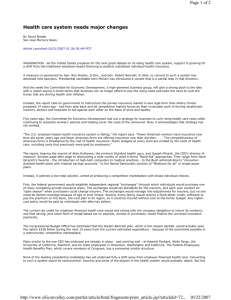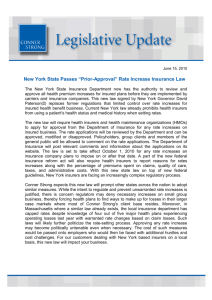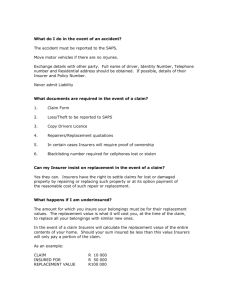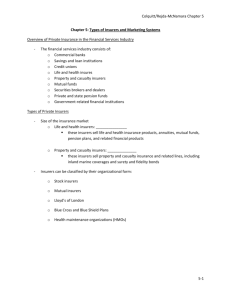AALU/Washington update - Atlanta Chapter of FSP
advertisement
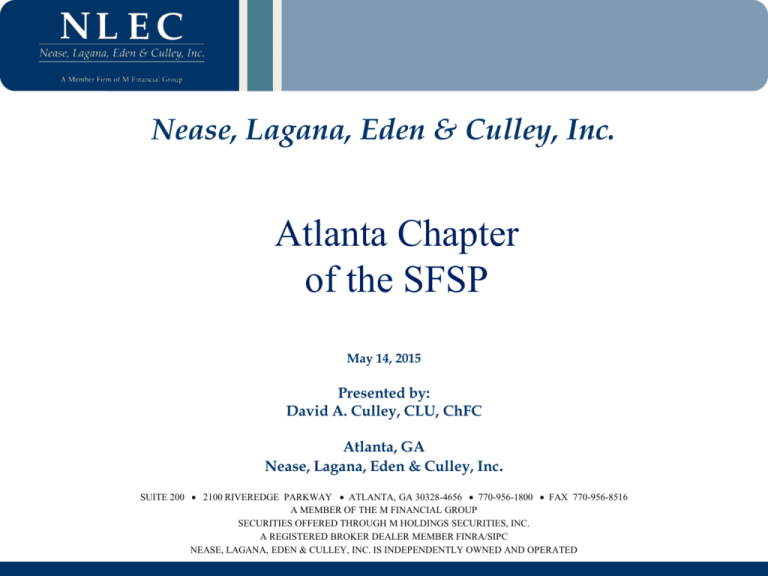
Nease, Lagana, Eden & Culley, Inc. Atlanta Chapter of the SFSP May 14, 2015 Presented by: David A. Culley, CLU, ChFC Atlanta, GA Nease, Lagana, Eden & Culley, Inc. SUITE 200 2100 RIVEREDGE PARKWAY ATLANTA, GA 30328-4656 770-956-1800 FAX 770-956-8516 A MEMBER OF THE M FINANCIAL GROUP SECURITIES OFFERED THROUGH M HOLDINGS SECURITIES, INC. A REGISTERED BROKER DEALER MEMBER FINRA/SIPC NEASE, LAGANA, EDEN & CULLEY, INC. IS INDEPENDENTLY OWNED AND OPERATED 1 Affluent Trends What type of life insurance products are being used and why? Variable Universal Life is the most commonly used chassis in the affluent market Affluent families want the flexibility, control, and access to top tier investment advice to maintain maximum control of their life insurance portfolio They recognize that they may need to make future changes based on their estate planning needs 2 Affluent Funding Strategies What funding strategies are affluent purchasers of life insurance using? Lifetime exemption – gifting capacity Split dollar – private loans – Taking advantage of low AFR’s Income producing assets owned by trusts, FLP’s & other entities Premium Finance 3 Evaluating Policy Performance & Benchmarking to the Marketplace Clients should have specific targets and goals as to amount of coverage, duration and funding levels. On annual basis, the policy should have its current projections compared to the original model – Has the duration been impacted? Is the cash value ahead or behind from where it needs to be? Have interest crediting rates changed since the inception of policy? If VUL is being used, is the asset allocation within the policy appropriate? 4 Practical Guidance – Maintaining a Life Insurance Portfolio All existing policies should be reviewed A. Life insurance illustrations and performance contain both guaranteed and nonguaranteed values B. Product performance will change over time C. Policyholder actions may be required to maintain the insurance goal D. Different product types have varying risks and guarantees which impact product performance E. The impact is not intuitive. It is often more severe than expected. F. Policies are sold based on expected experience of the carrier at the time of acquisition G. Insurers change product charges, loads and interest crediting rates (subject to guarantees) as emerging experience is realized 5 Low Rates – Impact on Carriers Insurer portfolio yields lag new money interest rate and continue to drop Lower portfolio yields drive higher capital requirements for guarantees (i.e. reserves) which can lower insurer earnings Lower portfolio yields reduce interest margins and provide margin recovery challenges for insurers: Due to competitive concerns, insurers hesitate to lower crediting rates, accepting some level of margin compression Interest rate margins are further reduced as crediting rates approach minimum guaranteed rates, especially in older blocks with higher guarantees Lower interest margins are placing pressure on carriers to reduce expenses or consider raising Cost of Insurance Charges (COI’s) Lower Insurer Portfolio Yields Reduce Interest Margins and Increase Capital Requirements For Guarantees 6 Low Rates – Impact on Policy Owners In-force policies are experiencing less than projected crediting rates Insurers are lowering guaranteed minimum crediting rates on new products to protect against further portfolio yield deterioration Insurers are offering less favorable guarantees Insurers have implemented premium restrictions Insurers have implemented interest rate hedge programs to protect against an interest rate spike, which reduces overall profits and impacts new product pricing (i.e., increased product charges or increased interest spreads through lower crediting rates) Insurers are considering and/or increasing the use of alternative investment strategies to enhance their portfolio yield and crediting rates 7 Interest Rate Trends for Life Insurance Representative Dividend Scale History YEAR 1995 2000 2005 2010 2014 HIGH 9.00 8.80 8.00 7.00 7.10 LOW 6.75 6.50 4.50 5.45 4.50 AVERAGE 8.18 7.89 6.43 5.97 5.51 8 Average Dividend Scale History 1991 to 2013 11.00 10.00 9.00 8.00 7.00 6.00 5.00 4.00 1991 1992 1993 1994 1995 1996 1997 1998 1999 2000 2001 2002 2003 2004 2005 2006 2007 2008 2009 2010 2011 2012 2013 Moody's Corp AAA 7-Year Rolling Average Average Dividend Scale 13 Top LI Companies 9 Potential Options For Consideration Options for those whose Life Insurance needs have changed: Drive greater efficiencies via reducing premium or paying up the policy Discontinue premium payments and let the policy last as long as there is cash value (CSV) to support it Surrender the policy – examine the IRR before doing so and compare to other investment alternatives. Prior to surrender, determine taxable gain if any. Annuitize – IRC Section 1035 exchange into an annuity Convert the policy to a hybrid life insurance / long term care product - qualifies as a tax free exchange Sell into secondary market 10 Current Market Environment Understanding Mortality Over the last 50 years, mortality rates have decreased at an annual rate of 1-2 % More recently, mortality rates have continued to improve at a slower pace The affluent market has averaged 20-30% lower mortality vs. the generally insured public A 10% improvement in mortality could translate into premium savings of 3-5% depending on product type and configuration Insurers generally reduce mortality charges for new policies to keep them competitive, but most insurers have NOT passed on better mortality experience to in-force policyholders In the affluent market, some insurers have a track record of passing favorable gains to in-force policies There are insurers who have specific pricing for the affluent market, largely based on the more favorable mortality exhibited by this segment of the population 11
